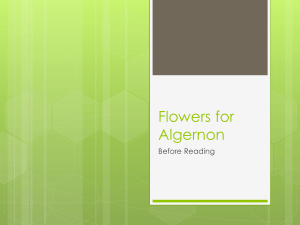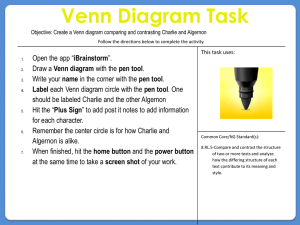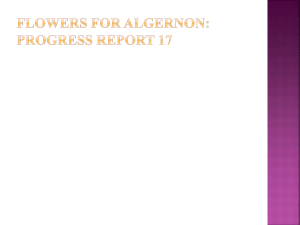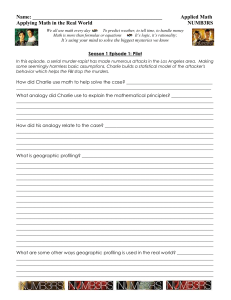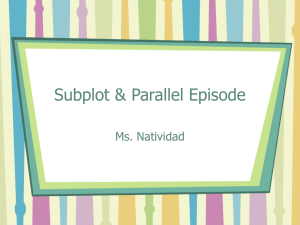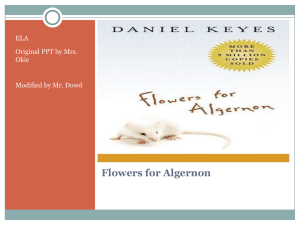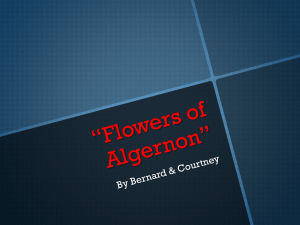Language Class 2011 FFA Comparison, contrast
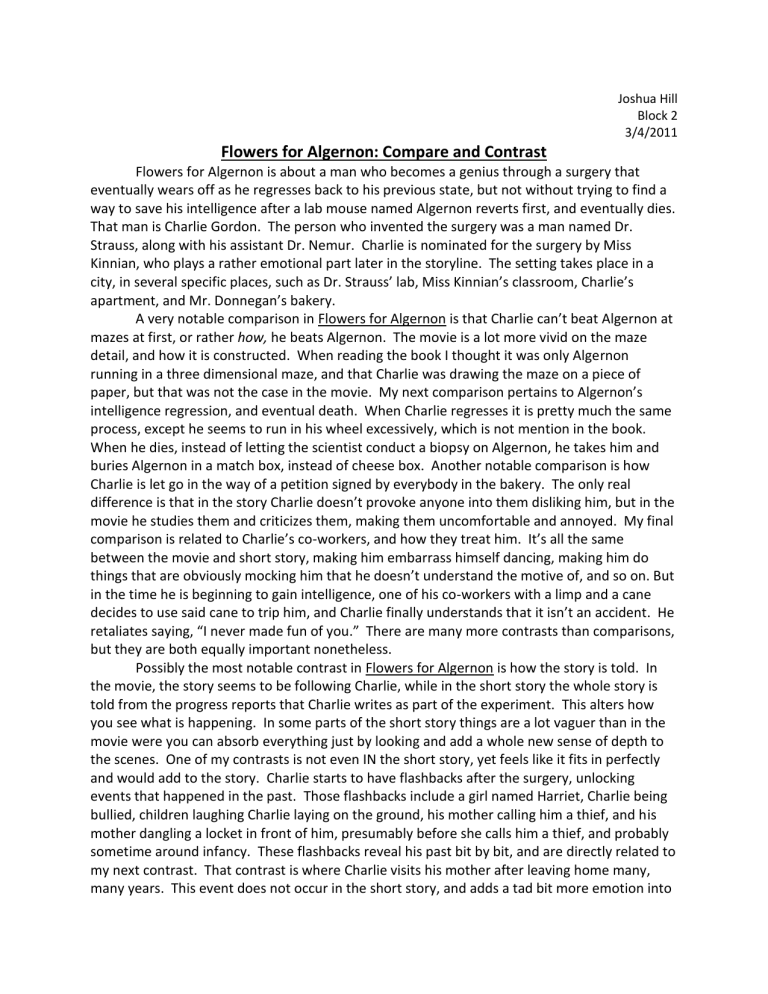
Joshua Hill
Block 2
3/4/2011
Flowers for Algernon: Compare and Contrast
Flowers for Algernon is about a man who becomes a genius through a surgery that eventually wears off as he regresses back to his previous state, but not without trying to find a way to save his intelligence after a lab mouse named Algernon reverts first, and eventually dies.
That man is Charlie Gordon. The person who invented the surgery was a man named Dr.
Strauss, along with his assistant Dr. Nemur. Charlie is nominated for the surgery by Miss
Kinnian, who plays a rather emotional part later in the storyline. The setting takes place in a city, in several specific places, such as Dr. Strauss’ lab, Miss Kinnian’s classroom, Charlie’s apartment, and Mr. Donnegan’s bakery.
A very notable comparison in Flowers for Algernon is that Charlie can’t beat Algernon at mazes at first, or rather how, he beats Algernon. The movie is a lot more vivid on the maze detail, and how it is constructed. When reading the book I thought it was only Algernon running in a three dimensional maze, and that Charlie was drawing the maze on a piece of paper, but that was not the case in the movie. My next comparison pertains to Algernon’s intelligence regression, and eventual death. When Charlie regresses it is pretty much the same process, except he seems to run in his wheel excessively, which is not mention in the book.
When he dies, instead of letting the scientist conduct a biopsy on Algernon, he takes him and buries Algernon in a match box, instead of cheese box. Another notable comparison is how
Charlie is let go in the way of a petition signed by everybody in the bakery. The only real difference is that in the story Charlie doesn’t provoke anyone into them disliking him, but in the movie he studies them and criticizes them, making them uncomfortable and annoyed. My final comparison is related to Charlie’s co-workers, and how they treat him. It’s all the same between the movie and short story, making him embarrass himself dancing, making him do things that are obviously mocking him that he doesn’t understand the motive of, and so on. But in the time he is beginning to gain intelligence, one of his co-workers with a limp and a cane decides to use said cane to trip him, and Charlie finally understands that it isn’t an accident. He retaliates saying, “I never made fun of you.” There are many more contrasts than comparisons, but they are both equally important nonetheless.
Possibly the most notable contrast in Flowers for Algernon is how the story is told. In the movie, the story seems to be following Charlie, while in the short story the whole story is told from the progress reports that Charlie writes as part of the experiment. This alters how you see what is happening. In some parts of the short story things are a lot vaguer than in the movie were you can absorb everything just by looking and add a whole new sense of depth to the scenes. One of my contrasts is not even IN the short story, yet feels like it fits in perfectly and would add to the story. Charlie starts to have flashbacks after the surgery, unlocking events that happened in the past. Those flashbacks include a girl named Harriet, Charlie being bullied, children laughing Charlie laying on the ground, his mother calling him a thief, and his mother dangling a locket in front of him, presumably before she calls him a thief, and probably sometime around infancy. These flashbacks reveal his past bit by bit, and are directly related to my next contrast. That contrast is where Charlie visits his mother after leaving home many, many years. This event does not occur in the short story, and adds a tad bit more emotion into
the movie. The importance of this event is to find out who Charlie was raised by, along with what kind of a person his mother is, and seeing if that ties into his low intelligence in some way, which it did. Without the support and love he needed, he dropped out of school early and went off to live his life. My final contrast, in all complicity like an alternate ending, is where in the movie Charlie asks Miss Kinnian to leave the city, where in the short story he leaves himself so that he doesn’t have to stay where he would remember everything that happened before, during the period of intelligence, and after it ends. The reason that he asks Miss Kinnian to leave is so that she doesn’t have to see him as he is when he loses the intelligence he had
BEFORE the operation, and has to be sent to a place where people will take care of him for he can no longer function on his own. The movie in all honesty was more detailed, having a wider selection of contrasts, but as previously stated, the comparisons and contrasts are equal in importance for the creation of a great story.
I honestly enjoyed the movie better, and this is coming from someone who enjoys their books quite a bit more than the average person. The movie seemed to add more depth, rather than taking it away. The movie was more vivid than the short story; adding scenes that created more emotions and made the movie feel generally better than the short story. Making the movie more enjoyable to watch than to read the short story was well accomplished.
